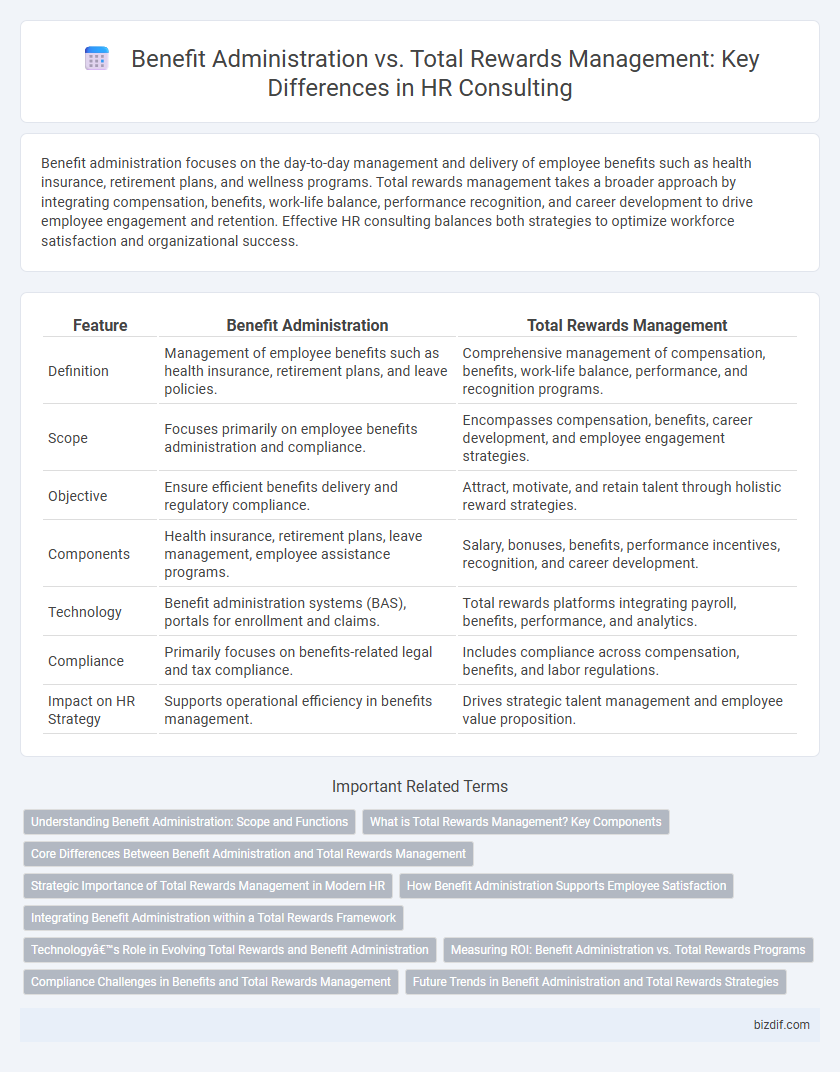Benefit administration focuses on the day-to-day management and delivery of employee benefits such as health insurance, retirement plans, and wellness programs. Total rewards management takes a broader approach by integrating compensation, benefits, work-life balance, performance recognition, and career development to drive employee engagement and retention. Effective HR consulting balances both strategies to optimize workforce satisfaction and organizational success.
Table of Comparison
| Feature | Benefit Administration | Total Rewards Management |
|---|---|---|
| Definition | Management of employee benefits such as health insurance, retirement plans, and leave policies. | Comprehensive management of compensation, benefits, work-life balance, performance, and recognition programs. |
| Scope | Focuses primarily on employee benefits administration and compliance. | Encompasses compensation, benefits, career development, and employee engagement strategies. |
| Objective | Ensure efficient benefits delivery and regulatory compliance. | Attract, motivate, and retain talent through holistic reward strategies. |
| Components | Health insurance, retirement plans, leave management, employee assistance programs. | Salary, bonuses, benefits, performance incentives, recognition, and career development. |
| Technology | Benefit administration systems (BAS), portals for enrollment and claims. | Total rewards platforms integrating payroll, benefits, performance, and analytics. |
| Compliance | Primarily focuses on benefits-related legal and tax compliance. | Includes compliance across compensation, benefits, and labor regulations. |
| Impact on HR Strategy | Supports operational efficiency in benefits management. | Drives strategic talent management and employee value proposition. |
Understanding Benefit Administration: Scope and Functions
Benefit administration involves managing employee compensation elements such as health insurance, retirement plans, and paid time off, ensuring compliance with legal regulations and facilitating employee access to these benefits. It encompasses tasks like enrollment, claims processing, and communication of benefits options, playing a crucial role in employee satisfaction and retention. Effective benefit administration integrates data management and vendor coordination to optimize cost-efficiency and support organizational goals within HR consulting frameworks.
What is Total Rewards Management? Key Components
Total Rewards Management encompasses a strategic approach to employee compensation, benefits, work-life balance, performance recognition, and career development designed to attract, motivate, and retain talent. Key components include base salary, incentive programs, health and wellness benefits, retirement plans, employee recognition initiatives, professional growth opportunities, and flexible work arrangements. This holistic framework integrates monetary and non-monetary rewards to enhance organizational culture and employee engagement.
Core Differences Between Benefit Administration and Total Rewards Management
Benefit Administration focuses primarily on managing employee benefits such as health insurance, retirement plans, and paid time off, ensuring compliance and efficient plan delivery. Total Rewards Management encompasses a broader strategy that integrates compensation, benefits, work-life balance, performance recognition, and career development to enhance employee engagement and retention. The core difference lies in Benefit Administration's tactical execution versus Total Rewards Management's strategic approach to aligning rewards with organizational goals.
Strategic Importance of Total Rewards Management in Modern HR
Total Rewards Management integrates compensation, benefits, work-life balance, performance recognition, and development opportunities to align employee value with organizational goals. It drives talent attraction, retention, and engagement by offering a comprehensive value proposition beyond traditional benefit administration. Strategic implementation of Total Rewards fosters a culture of motivation and productivity, enhancing overall business performance in competitive markets.
How Benefit Administration Supports Employee Satisfaction
Benefit administration directly enhances employee satisfaction by streamlining the management of health insurance, retirement plans, and paid time off, ensuring timely and accurate access to essential benefits. Efficient handling of these services reduces employee stress and fosters trust in the organization's commitment to their well-being. This targeted approach within HR consulting helps maintain a motivated workforce by addressing immediate employee needs related to compensation and workplace benefits.
Integrating Benefit Administration within a Total Rewards Framework
Integrating benefit administration within a total rewards framework streamlines compensation strategies by aligning employee benefits with broader organizational goals. Total rewards management encompasses salary, incentives, benefits, and work-life balance programs to enhance employee engagement and retention. Effective integration ensures benefits administration supports holistic talent management, driving productivity and organizational performance.
Technology’s Role in Evolving Total Rewards and Benefit Administration
Technology revolutionizes total rewards management by integrating data analytics, artificial intelligence, and cloud platforms to deliver personalized benefits and real-time insights. Automated systems streamline benefit administration processes, reducing errors and enhancing employee engagement through self-service portals and mobile accessibility. Advanced HR technology enables seamless adaptation to evolving workforce needs, driving strategic decision-making and optimizing compensation, wellness, and recognition programs.
Measuring ROI: Benefit Administration vs. Total Rewards Programs
Measuring ROI in Benefit Administration centers on quantifiable cost management such as healthcare expenses, claims processing, and enrollment efficiency, providing clear financial metrics for evaluating program impact. Total Rewards Management expands ROI analysis by integrating employee engagement, retention rates, productivity improvements, and overall workforce satisfaction, offering a comprehensive understanding of how rewards influence organizational performance. Organizations leveraging Total Rewards programs often achieve a higher return on investment due to the holistic approach in aligning benefits, compensation, and recognition with strategic business goals.
Compliance Challenges in Benefits and Total Rewards Management
Compliance challenges in benefit administration focus on adhering to federal and state regulations such as ERISA, ACA, and COBRA, which require accurate reporting and timely communication to avoid costly penalties. Total rewards management broadens compliance scope to include wage and hour laws, tax regulations, and anti-discrimination statutes, necessitating ongoing audits and policy updates to ensure legal alignment. Both require robust recordkeeping systems and employee training to mitigate risks related to regulatory violations and employee dissatisfaction.
Future Trends in Benefit Administration and Total Rewards Strategies
Future trends in Benefit Administration emphasize the integration of AI-driven analytics to personalize employee benefits, improving engagement and cost-efficiency. Total Rewards Management evolves by leveraging digital platforms that combine compensation, benefits, and wellness programs into unified, user-friendly experiences. Employers increasingly prioritize flexible, data-informed reward strategies that adapt to diverse workforce needs and promote long-term retention.
Benefit Administration vs Total Rewards Management Infographic

 bizdif.com
bizdif.com